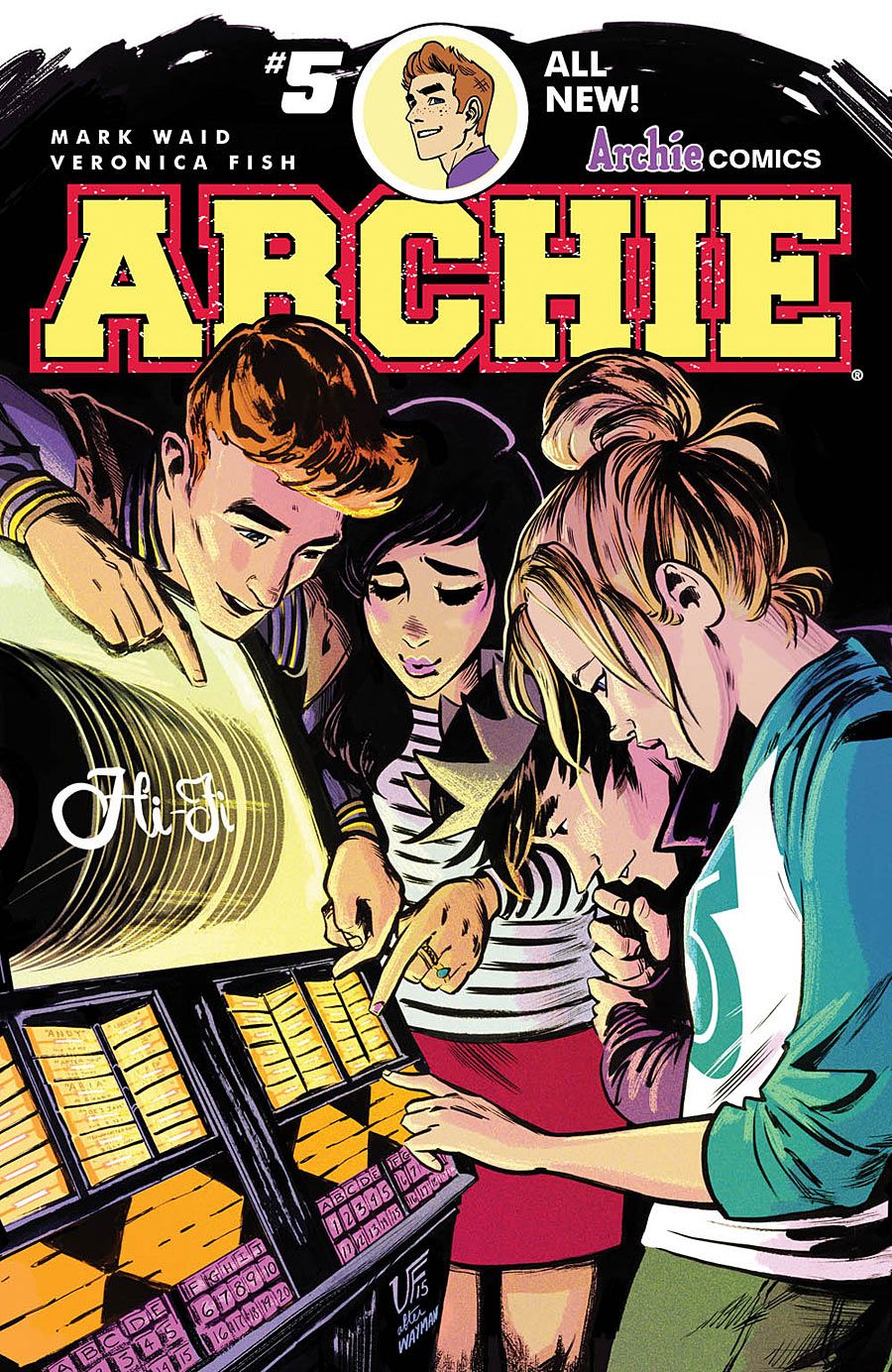Mark Waid and Veronica Fish's "Archie" #5 reintroduces another major classic character, Reggie Mantle, when Jughead and Betty recruit him for their plan to rescue Archie from Veronica's well-manicured clutches. Waid plays with the reader's expectations in opening sequence, in which Archie speaks directly to the reader and says that he is the one who has to do the rescuing.
While the framing device eases the reader into the story and establishes another layer, it's easily the weakest part of "Archie" #5. The appropriately corny punchline ends the issue on a positive note, but the transition in tone is too abrupt a shift from the devastating scene before it. Also, the analogy of the centipede to one of the characters is imperfect. It doesn't stand up to extension or examination, and it also doesn't neatly tie into the moral themes that dominate the rest of the plot.
Archie builds suspense by calling Reggie the "supervillain" of Riverdale, but Waid's approach to Reggie is fascinating and subtle and nothing so direct as ordinary supervillain antics. Reggie is an active character, but it's really the "good" characters' motivations that cause harm. Reggie is rude and boorish, but it would be outlandish to call him evil. Instead, he worsens the plans of others, both tactically and morally, because of his lack of concern for others -- but he can only do that if he's invited into plans in the first place.
Jughead's offhanded insult, "You deal with the devil, you always pay a price," is ominous and prescient. Appropriately, the price is moral, not physical. The price Betty and Jughead must pay may not seem so dire on the surface (no one dies, breaks up or even sprains an ankle), yet -- to Waid and Fisher's enormous credit -- the results are wrenching. It's classic high school stuff, where changes in friendships and relationships can feel like the end of the world. Waid is able to tap into a vein of strong emotion without resorting to sentimentality or melodrama. No one needs to go to the hospital or have secrets; Waid understands that -- when a good friend is angry and disappointed in you and trust has been damaged -- it is ample enough reason for some heartbreak.
Veronica Fish continues the streak of great art on "Archie." She's able to shift easily from a cartoony style for humorous moments like Veronica's stomping to detailed gestures and facial expressions for more serious scenes. Her linework has a graceful sense of movement. She follows and extends the psychological and emotional nuances in Waid's script. Fish's composition skills also create suspense and smooth plot transitions, like when she guides the reader's eye to the "tonk" of a Reggie's pen on the bottom of a locker door.
The climax of the story occurs in Room 402. Waid's dialogue is natural and delightful to follow as usual throughout "Archie" #5, but the staccato rhythm he uses for Veronica's exclamations is especially effective in guiding the pace and pitch of emotion. Although this is Reggie's debut in the new "Archie," the story's real focus is Veronica and Betty. Waid and Fish rapidly further the characterization of both girls. Veronica's reaction in Room 402 shows she's an appreciator of beauty and form in fashion, but it also shows she's an appreciator of Archie Andrews. The big plot twist is wacky and unexpected, but Waid and Fish pull it off. The scene shows the reader -- and notably, also Betty -- that, "in her way," Veronica may care for Archie and she certainly sees what makes him special.
The climax is affecting, but the scene where Jughead and Betty wait outside the party tent is even more arresting. Andre Szymanowicz's color work is imaginative and beautiful throughout, but I was especially impressed by the gorgeous faceted ombre for Betty's dress. The technique is unusual and perfect for the scene, reinforcing the contrast between Betty with Veronica and making Betty pop against the background like a candle. Fish and Waid's creative teamwork is exceptionally concise and eloquent in this scene. Fish gets across the duo's shared guilt, timidity and hope in body language and facial expressions. Betty gets the most poetically sad, most heartbreaking line when she says, "Maybe no one. Maybe the right one." The entire scene is exquisite for its powerful mix of moral depth and restrained emotion. Probably the most self-aware and mature character in "Archie," Betty refuses to let rivalry or jealousy blind her. It's poignant to witness her realization she may have been wrong, that she and Jughead don't have an exclusive claim on Archie appreciation or Archie's love.
"Archie" was already an unqualified success for its humor, characterization and art, but "Archie" #5 goes further, achieving a bittersweet profundity without losing its light touch.

